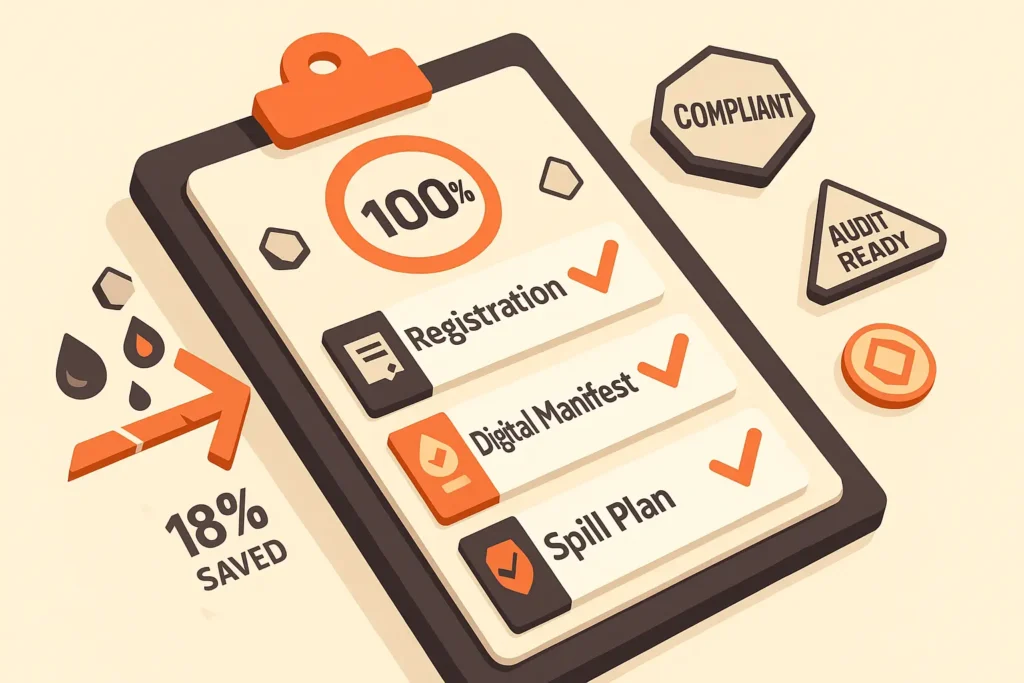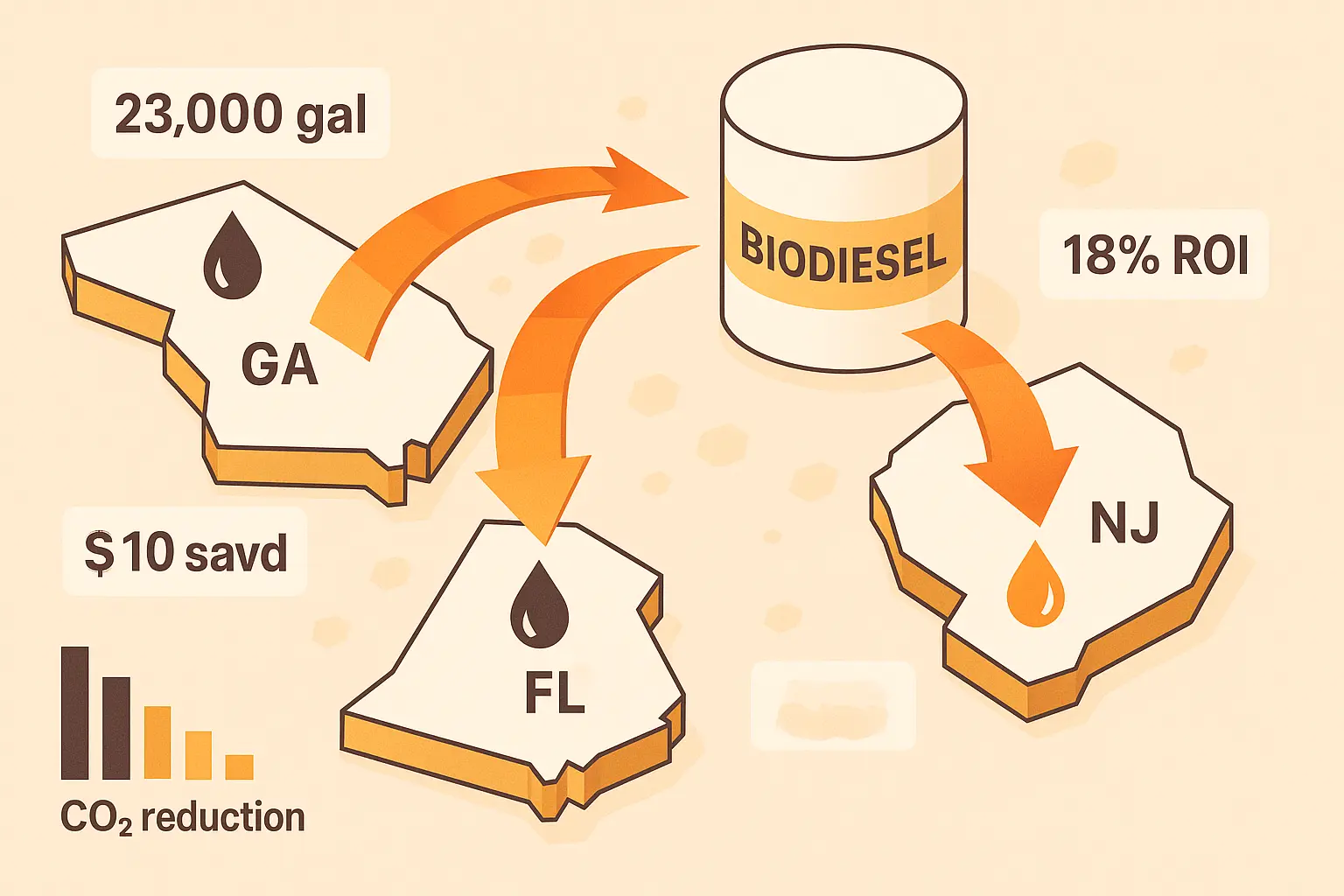Table of Contents
Why Your Waste Oil Strategy Drives Profit Not Just Compliance
Used cooking oil is no longer a throw away cost. Florida updated Rule 62 710 in April 2025, requiring annual registration and spill response plans for any food plant that stores more than 55 gallons of waste oil. Similar rules in Georgia’s 2022 Industrial General Permit treat fats, oils, and grease as monitored storm water pollutants, while New Jersey’s 2024 Food Waste to Energy law forces large generators to document diversion paths each year. Plants meeting these mandates and recycling oil into biodiesel cut disposal fees up to 40 percent and earn carbon credit revenue, according to a 2024 market study. In other words, mastering waste oil turns a liability into a ledger line gain.

Keys to Choosing a Vendor with a Real Track Record
- Closed loop evidence. Ask for manifests showing your actual gallons delivered to certified processors; EPA guidance stresses cradle to grave visibility for used oil.
- Regulatory fit. Verify the company’s handler ID in Florida’s online registry or Georgia’s NOI database; missing IDs trigger fines.
- Documented savings. An Augusta, GA food plant cut interceptor pumping costs 32 percent after switching to weekly vacuum collections. A 2025 field case shows rebate credits covering service fees in month four.
Selecting on these proofs, not on cheapest price, locks in both compliance and ROI.
Proof in the Fryer: Case Studies from the Southeast Corridor
In Miami Dade, a snack facility diverted 23,000 gallons to local biodiesel in 2024, eliminating 18 metric tons of CO₂ equivalents. A Gainesville, GA poultry processor doubled oil rebates after installing bulk tanks and remote fill lines in 2023. In Camden County, NJ a bakery met the new food waste rule by switching to sealed outdoor tanks and digital pickup logs, avoiding $10,000 in potential fines.
Results are consistent: weekly pickups, sealed steel containers, and digital manifests reduced spill incidents to zero in all three plants, while average oil rebates rose 18 percent.
![infographic showing before/after fuel gauge icons for carbon saved and dollars earned]](https://greaseconnections.com/wp-content/uploads/2025/06/before-and-after-rebates-1024x683.webp)
Regulations Decoded: Pass Every Inspection the First Time
| State | Registration Needed | Manifest Rule | Annual Reporting | Penalty Range |
|---|---|---|---|---|
| Florida | Yes: Chapter 62 710 | 40 CFR 279 manifests adopted | Handler renewal by 6/30 | $5k per day |
| Georgia | NOI under Permit GAR050000 | SWPPP must list FOG controls | Storm water report yearly | $10k per violation |
| New Jersey | Large generators file NJDEP form | Source separated oil counts | Food waste report by 10/14 | $15k per offense |
Keep these four docs on file: registration certificate, insurance, spill plan, last 12 months of manifests. Inspectors typically ask for them first.
ROI You Can Taste: Sustainability and Savings in One Loop
Better oil management lifts profit on two fronts. Plants that filter oil and recycle spent gallons save 12 to 18 percent on fresh oil purchases and interceptor pumping, according to 2025 operations data in Modern Restaurant Management. On the carbon side, every gallon recycled avoids 10 kg CO₂ and supports the 6 billion gallon U.S. biodiesel goal for 2030. High demand for low carbon feedstock means rebates rose 22 percent year over year nationwide. In short, closing your oil loop pays you back while future proofing your facility.
Rapid Vendor Vetting Checklist
| Proof Point | What to Ask | Acceptable Evidence |
|---|---|---|
| Compliance ID | State handler/registration # | Certificate screenshot |
| Chain of Custody | Digital manifests | PDF or portal access |
| Insurance & Spill Plan | $1 M coverage minimum | Policy page, spill SOP |
| Case Study Data | Local food plant results | Before/after metrics |
| Rebate Structure | $/gal formula | Contract clause |
Ready to Act? Grease Connections Makes It Easy
Our Florida, Georgia, and New Jersey teams handle the paperwork, supply leak proof bulk tanks, and issue digital manifests that sync with your environmental dashboard. For pickup schedules in Miami or Atlanta, visit our city hubs. We even plug data into your ESG reports at no extra charge. Talk with a waste oil specialist today and turn yesterday’s fryer oil into tomorrow’s profit.









